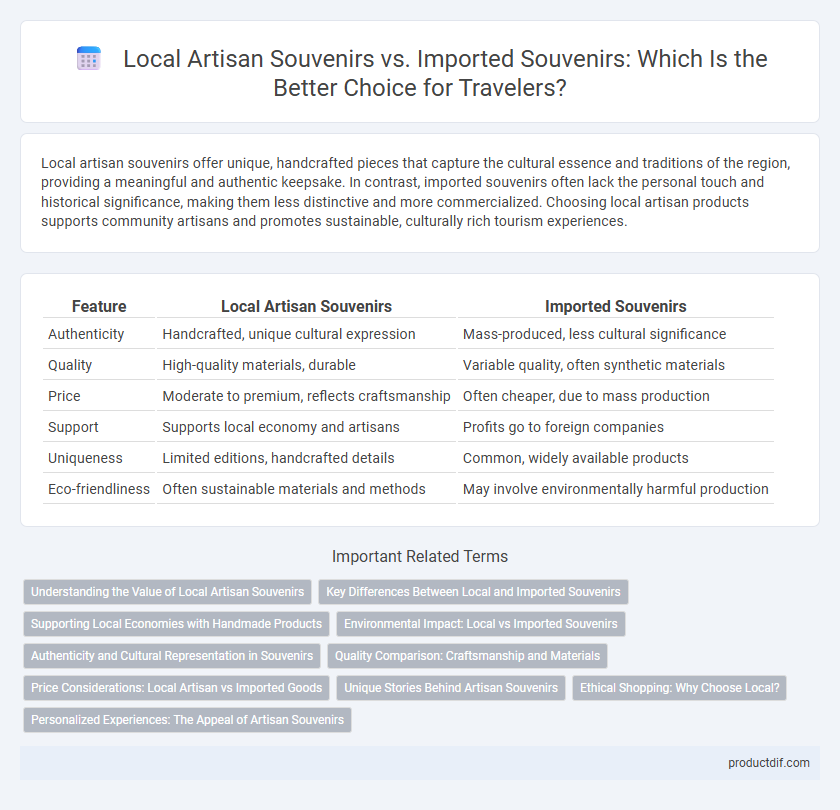Local artisan souvenirs offer unique, handcrafted pieces that capture the cultural essence and traditions of the region, providing a meaningful and authentic keepsake. In contrast, imported souvenirs often lack the personal touch and historical significance, making them less distinctive and more commercialized. Choosing local artisan products supports community artisans and promotes sustainable, culturally rich tourism experiences.
Table of Comparison
| Feature | Local Artisan Souvenirs | Imported Souvenirs |
|---|---|---|
| Authenticity | Handcrafted, unique cultural expression | Mass-produced, less cultural significance |
| Quality | High-quality materials, durable | Variable quality, often synthetic materials |
| Price | Moderate to premium, reflects craftsmanship | Often cheaper, due to mass production |
| Support | Supports local economy and artisans | Profits go to foreign companies |
| Uniqueness | Limited editions, handcrafted details | Common, widely available products |
| Eco-friendliness | Often sustainable materials and methods | May involve environmentally harmful production |
Understanding the Value of Local Artisan Souvenirs
Local artisan souvenirs embody unique cultural heritage and craftsmanship, offering authentic stories and traditional techniques rarely found in imported items. These handcrafted pieces support local economies and preserve artistic traditions, enhancing their intrinsic and sentimental value. Choosing local artisans ensures genuine quality and a meaningful connection to the destination's identity, unlike mass-produced imported souvenirs.
Key Differences Between Local and Imported Souvenirs
Local souvenirs often showcase unique craftsmanship, reflecting regional culture and traditions through handmade materials and authentic designs. Imported souvenirs tend to prioritize mass production, offering standardized products that may lack cultural significance and originality. The value of local souvenirs lies in their exclusivity and support for local economies, while imported items provide accessibility and variety at lower costs.
Supporting Local Economies with Handmade Products
Purchasing local artisan souvenirs directly supports small businesses and preserves traditional craftsmanship unique to the region. Handmade products boost local economies by providing employment opportunities and fostering cultural heritage. Imported souvenirs often lack this direct economic impact, making locally made items a more meaningful investment in community sustainability.
Environmental Impact: Local vs Imported Souvenirs
Local artisan souvenirs typically have a lower environmental impact due to reduced transportation emissions and the use of sustainable, locally sourced materials. Imported souvenirs often involve extensive shipping, contributing to higher carbon footprints and environmental degradation. Choosing local products supports eco-friendly practices and helps minimize the negative effects of global supply chains.
Authenticity and Cultural Representation in Souvenirs
Local artisan souvenirs embody authentic cultural representation through handmade craftsmanship, traditional techniques, and region-specific materials, offering a genuine connection to the heritage and history of the area. Imported souvenirs often lack this authenticity, as they are mass-produced with generic designs that may not reflect the local culture or artisan skills. Choosing local artisan products supports sustainable practices and preserves cultural identity, making souvenirs meaningful keepsakes rather than mere commercial goods.
Quality Comparison: Craftsmanship and Materials
Local artisan souvenirs often showcase superior craftsmanship, utilizing traditional techniques passed down through generations, which enhances both the uniqueness and cultural value of each piece. Materials used by local artisans are typically sourced regionally, ensuring authenticity and a closer connection to the local environment. Imported souvenirs may offer mass-produced consistency but often lack the intricate detailing and durable materials found in handmade, locally crafted items.
Price Considerations: Local Artisan vs Imported Goods
Local artisan souvenirs often offer unique craftsmanship at competitive prices, reflecting authentic cultural value and supporting the regional economy. Imported souvenirs can be more expensive due to shipping, tariffs, and brand premiums, which may not guarantee genuine local quality. Price considerations should weigh the balance between affordability and authenticity, with local artisan products generally providing better value for culturally meaningful keepsakes.
Unique Stories Behind Artisan Souvenirs
Local artisan souvenirs embody unique cultural narratives and traditional craftsmanship that mass-produced imported souvenirs often lack. Each handmade item tells a story of the region's heritage, reflecting the artisan's personal history and the community's identity. By choosing local artisan souvenirs, travelers support sustainable economies while preserving authentic stories and customs.
Ethical Shopping: Why Choose Local?
Choosing local artisan souvenirs supports ethical shopping by promoting sustainable practices and fair wages within the community. Local artisans often use eco-friendly materials and traditional techniques, preserving cultural heritage while minimizing environmental impact. Unlike mass-produced imported souvenirs, handmade local items ensure authenticity and contribute directly to the local economy.
Personalized Experiences: The Appeal of Artisan Souvenirs
Local artisan souvenirs offer a unique personalized experience that mass-produced imported items cannot replicate, showcasing regional craftsmanship and cultural heritage. These handcrafted products often incorporate traditional techniques, providing authenticity and a tangible connection to the locale. Choosing artisan souvenirs supports local economies and preserves cultural identities, making each piece truly meaningful and exclusive.
Local Artisan vs Imported Souvenirs Infographic

 productdif.com
productdif.com